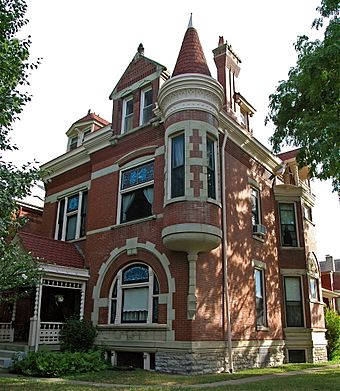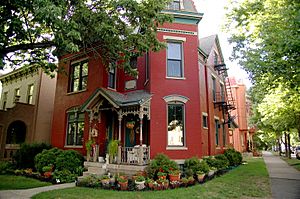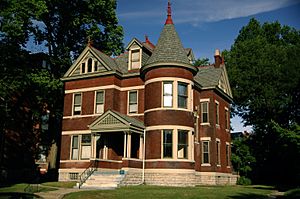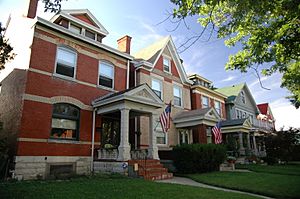East Row Historic District facts for kids
Quick facts for kids |
|
|
Mansion Hill Historic District
and Boundary Increase |
|

One of the district's namesake mansions
|
|
| Location | Roughly bounded by Interstate 471, Washington Ave., 2nd and 6th Sts.; also roughly bounded by Washington Ave., 6th, Saratoga and 3rd Sts., Newport, Kentucky |
|---|---|
| Area | 44 acres (18 ha); 6 acres (2.4 ha) |
| Architectural style | Second Empire, Greek Revival, Victorian |
| NRHP reference No. | 80001493; 85001678 |
| Added to NRHP | July 17, 1980; August 1, 1985 |
The East Row Historic District is a special area in Newport, Kentucky. It's known for its beautiful old houses. This district is the second largest historic district in the entire state of Kentucky.
The East Row was formed by joining two older neighborhoods: Mansion Hill and Gateway. These areas have a rich history that goes back to the early days of Newport.
Contents
How Did Newport Begin?
The Taylor Family's Role
Newport was first settled in the 1790s by General James Taylor Jr.. He inherited a huge piece of land, about 1,500 acres (6.1 km²), from his father. His father had bought this land from a friend named George Muse. Muse received the land for his service in the French and Indian War.
James Taylor Jr. moved to Newport with his wealthy wife, Keturah Moss Leitch. The Taylor family was very well-connected. They had two cousins, James Madison and Zachary Taylor, who later became presidents of the United States. The Taylors brought a touch of colonial culture to Northern Kentucky.
Building a Home on the Hill
James Taylor Jr. chose a high hill overlooking the Ohio River for his large home. This house, called Bellevue, was built in the Greek Revival style. It still stands today. When James Taylor Jr. passed away in 1848, he was one of the wealthiest people in Kentucky.
Newport's Golden Age
Growth and Elegant Homes
In the mid-1800s, Newport became a busy center for trade, industry, and culture. The Victorian era was a very successful time for Newport. You can see this in the elegant houses of the East Row. Many of them look almost exactly as they did over 100 years ago.
The East Row area became popular when James Taylor Jr.'s grandson decided to divide the family's land into smaller plots. This new area was called Taylor's Row Addition. It quickly became a favorite spot for wealthy business owners and merchants in the late 1800s.
What Makes East Row Special?
The East Row Historic District has 1,070 homes. It is Kentucky's second largest historic district. All the buildings in East Row are listed on the National Register of Historic Places. This means they are recognized for their historical importance.
The earliest houses in the district were built in the Italianate style. Later homes showed different styles, like Queen Anne, Colonial Revival, and American Foursquare.
Bringing the Neighborhood Back to Life
Community Spirit and Restoration
By the late 1970s, the East Row neighborhood faced some challenges. Many of the large homes had been divided into smaller apartments. Property prices were low. This made the area attractive to people who wanted to restore old homes.
The Mansion Hill Neighborhood Association was started in 1979. Homeowners began to restore the beautiful houses. They worked to bring back the original beauty of the area. The Mansion Hill Tour, which started in 1979, helped attract more people to the neighborhood.
In the early 1980s, many people who cared about preserving history lived in the Gateway neighborhood. These two neighborhoods, Mansion Hill and Gateway, decided to work together in the mid-1980s. This teamwork helped create the East Row Historic District we see today.
East Row Today
Close to Modern Attractions
The East Row Historic District is just a few blocks from Newport's riverfront. This area has been redeveloped and is now a lively place. You can find restaurants and clubs at Riverboat Row and Newport on the Levee.
The World Peace Bell and the Newport Aquarium are also very close to the Historic District. This makes East Row a great place to live, combining history with modern fun.
Expanding the Historic Area
In 2006, the Newport City Commission made the Historic District even larger. They included the north side of Second Street, the west side of Washington Avenue, and the 200 block of East Fourth Street. East Fourth Street has several homes from the American Civil War era. Some of these homes are also in the Greek Revival style.
East Row Site
Images for kids
 | Chris Smalls |
 | Fred Hampton |
 | Ralph Abernathy |







